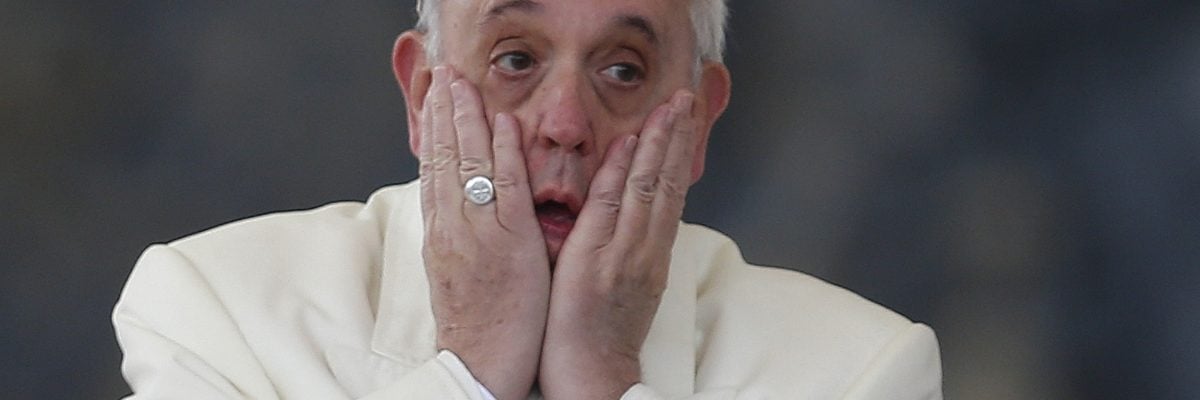
Abraham Lincoln once said you shouldn’t believe every quote you find on the internet. This is especially true when it comes to quotes from the saints or popes. Here are three examples attributed to the last three popes.
1. “Don’t go to God for forgiveness of sins: come to me.”
— Pope St. John Paul II
Unlike many fake quotes, this one has a source that can be checked: the Los Angeles Times, December 12, 1984.
The article, written by Don Schance, is about Pope St. John Paul II’s apostolic exhortation Reconciliation and Penance, promulgated ten days earlier. One of the exhortation’s principal themes was an explanation of the sacrament of reconciliation and the need to combat attitudes that undermine it. These include “the lessening of a sense of sin, the distortion of the concept of repentance,” and “the sometimes widespread idea that one can obtain forgiveness directly from God, even in a habitual way, without approaching the sacrament of reconciliation.”
This probably served as an inspiration for the article’s headline, “No Forgiveness ‘Directly From God,’ Pope Says,” which later authors erroneously quoted as, “Don’t Go to God for Forgiveness of Sins: Come to Me.” But John Paul II never said God can’t or won’t directly forgive sin. In Reconciliation and Forgiveness he said, “[T]he sacrament of penance is the primary way of obtaining forgiveness and the remission of serious sin committed after baptism.” He went on to say:
Certainly the Savior and his salvific action are not so bound to a sacramental sign as to be unable in any period or area of the history of salvation to work outside and above the sacraments. But in the school of faith we learn that the same Savior desired and provided that the simple and precious sacraments of faith would ordinarily be the effective means through which his redemptive power passes and operates (31).
2. “Show me just what Muhammad brought that was new, and there you will find things only evil and inhuman, such as his command to spread by the sword the faith he preached. God is not pleased by blood, and not acting reasonably is contrary to God’s nature.” — Pope Benedict XVI
Even though the pope did utter these words, this is a kind of “fake quote” because he did not originate them—he was merely referring to them in order to make a point.
On September 12, 2006, Pope Benedict delivered a lecture at the University of Regensburg titled, “Faith, Reason and the University Memories and Reflection.” In one part he referred to a dialogue that took place between the fourteenth-century Byzantine emperor Manuel II Paleologus and a Persian interlocutor on the subject of Christianity and Islam. Benedict then quoted the passage above (while attributing it to the emperor) and noted how Islam’s view of God allows him to act in irrational ways, which includes commanding unjust acts of violence.
The quote was later circulated, out of context, in the English-speaking world, prompting this footnote to be added to the official address on the Vatican website:
In the Muslim world, this quotation has unfortunately been taken as an expression of my personal position, thus arousing understandable indignation. I hope that the reader of my text can see immediately that this sentence does not express my personal view of the Qur’an, for which I have the respect due to the holy book of a great religion. In quoting the text of the Emperor Manuel II, I intended solely to draw out the essential relationship between faith and reason. On this point I am in agreement with Manuel II but without endorsing his polemic.
3. “All religions are true, because they are true in the hearts of all those who believe in them. What other kind of truth is there?”
— Pope Francis
According to Fr. Thomas Rosica, a Canadian priest who serves at a media attaché for the Vatican, “Catholics do not adopt the attitude of religious relativism which regards all religions as on the whole equally justifiable, and the confusion and disorder among them as relatively unimportant.” This can be seen in Pope Francis’s first meeting with world leaders, where he said:
But there is another form of poverty! It is the spiritual poverty of our time, which afflicts the so-called richer countries particularly seriously. It is what my much-loved predecessor, Benedict XVI, called the “tyranny of relativism,” which makes everyone his own criterion and endangers the coexistence of peoples. And that brings me to a second reason for my name. Francis of Assisi tells us we should work to build peace. But there is no true peace without truth!
The Catholic Church accepts what is holy and true in other religions but does not claim that all religions are equally true. For example, Muslims are correct that there is only one infinite God, but they are incorrect when they deny that Jesus is the only begotten Son of God. Different religions have discovered truths about God and Christ, but the fullness of truth concerning God’s revelation is found in the Catholic Church.



